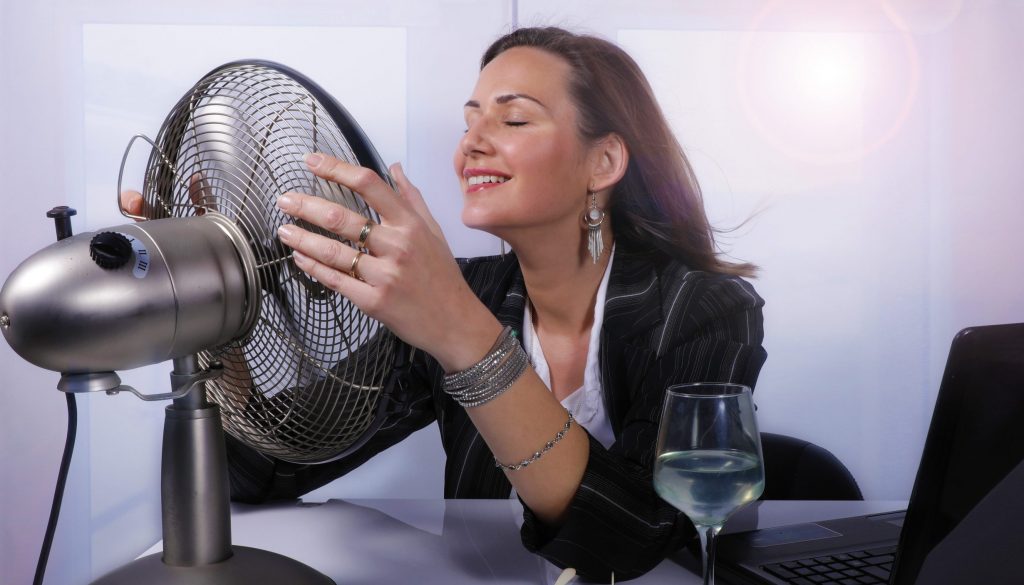Are Your Hormones Affecting Your Sex Life?
If you suspect that your hormones are negatively affecting your sex life… they could be… but not for the reasons you may think.
While puberty marks the beginning of your sexually reproductive years, menopause marks the end of them. To be clear, I don’t mean it marks the end of your sexuality, I simply mean that it marks the end of your ability to reproduce.
But what does reproduction have to do with anything?
Well, a lot, actually. Because…
Your reproductive years are when your hormones are at their peak.
These hormones grow your breasts, fill out your hips, create monthly cycles and provide the environment to grow a baby, as well as the ability to nourish it. Not to mention, give you your sex drive. Basically…
Your hormones create your femininity, your ability to procreate and the desire to do so.
Pretty important, right?
However, as soon as women start having health issues or a loss of libido after the age of 35, we’re told that it’s because of our hormones.
Not cool.
And it’s an easy sell because…
You probably suffer from pre-menstrual syndrome
Just because PMS is common, doesn’t mean it’s normal. It’s just that we are told that it is and sadly, we accept it. But…
The usual symptoms of PMS are not normal. They’re signs that something isn’t right.
What’s more, is that many of us women have taken birth control pills (which are synthetic hormones) to alter our natural hormones so that we don’t get pregnant. This is great for avoiding pregnancy, but they come with side effects and consequences.
Did you know?
Testosterone levels can be temporarily and permanently lowered from the use of birth control pills.
I didn’t.
Sadly, they can be. And many women are not advised of this before taking them. Although, given the fear of unwanted pregnancy, many of us would have taken them regardless.
However, the irony is that if taking them is going to lower your sex drive, because of the reduction in testosterone, you may not need birth control!
But notwithstanding the lack of desire, if you’re taking synthetic hormones or using an IUD, you’re messing with your natural hormones and this, in turn, throws your whole body off.
Not surprisingly, women are not as connected to their bodies and their cycles as they once were. Women, in a constant effort to keep up with being everything to everyone, do not follow the natural rhythms of their cycles and instead of listening to their bodies, just push through resistance. This resistance is there to slow you down. But many women are too busy to slow down and respect their bodies and as a result, they suffer from PMS symptoms.
Diet also has a huge impact on your cycles and whether or not you will have PMS issues.
READ: 5 Reasons Why You Should Slow Down
You suffer from hot flashes
Hot flashes are synonymous with menopause and precisely the reason why most women dread it. I mean, who wants to be a hot mess? Anyone?
Just like PMS symptoms, hot flashes are blamed on hormones.
But our hormones aren’t to blame. Our lifestyle is.
Yep. That’s because we’re doing too much, we aren’t taking care of ourselves, and we don’t know how to relax. Instead of grounding ourselves in the feminine, where we listen to our bodies and nurture them, many of us have developed our masculine capabilities of planning, ambition, and getting shit done. Which is great… until it leads to burnout and elevated stress levels.
Here’s the thing, your adrenals aren’t meant to be pumping out adrenaline 24/7. When they do, you can end up with adrenal fatigue… when the adrenals are not producing enough adrenaline and at other times producing too much. Too much adrenaline floods the body, and since adrenaline is corrosive, the liver tries to clean it up. Once the liver maxes out, it overheats and you get hot flashes.
Did you know?
Hot flashes and night sweats (hot flashes that happen at night) can be triggered by anything that increases your adrenaline.
And since coffee chemically increases your stress hormones, then your cup of java can serve as a trigger for them.
Learn to set boundaries, ask for help, let your man take care of you and relax. Reducing stress will reduce your hot flashes.
READ: 5 Signs That You’re Operating From The Masculine
You have more yeast infections
Most women will suffer from occasional vaginal infections, but they tend to happen more often when hormones are in flux. Changes in hormone levels during pregnancy, perimenopause, and menopause, as well during your period can increase the likelihood of having them. The use of birth control pills can have the same effect. But this change in hormones isn’t the cause of the infections.
Streptococcus is to blame.
When hormones are in flux, it creates a lowered immunity because the body’s efforts are going into looking after the reproductive system. This reduction in your immune system allows existing bacterial strep to proliferate.
Of course, there are other triggers… the use of antibiotics (which make strep stronger), diet, hot, humid weather, continuous use of panty liners, or tight-fitting clothing that doesn’t breathe.
In most cases, it’s a bacterial infection that’s increasing yeast. But if you have excess yeast, it’s not yeast that’s the problem. Yeast is just the canary in the coal mine.
At any rate, if you’ve got a yeast infection, you likely aren’t, nor should you be, engaging in sex.
Did you know?
Our vaginas normally have yeast bacteria… and this is a good thing. It’s just that under the conditions listed above, the existence of strep bacteria increases and so does the yeast that’s there to try to reduce it.
READ: 5 Easy Ways To Take Care Of Your Vaginal Health
You have a low sex drive
Your libido is impacted by many things, but if your hormones are out of balance, then they can affect your sex drive.
Your hormones are meant to work together in harmony. But if one is out of tune, it affects the whole band.
For instance, when your cortisol levels are high (that’s your stress hormone), then your body doesn’t produce your sex hormones. If your body is in fight-or-flight mode, it’s not going to be willing to lie down and have sex. So, you don’t need your sex hormones, right?
Furthermore, when your cortisol levels are high, they block the receptors for sex hormones, so even if you have enough sex hormones, cortisol has put its key in that keyhole and nobody else is getting in.
Did you know?
Testerone is known as the “hormone of desire”… because it gives you your sex drive. Therefore, if your testosterone levels are too low, you’re not going to feel like having sex and you won’t be able to will yourself into having it either.
That’s not to say that having more is better, because, with hormones, you don’t want too little or too much. You want just the right amount of each and in the right amounts in relation to each other. Think Goldilocks.
FYI: Even though menopause brings about a reduction in hormones, it doesn’t mark the end of your sexy years. In fact, it’s the beginning of a new chapter in your sexuality.
READ: 6 Reasons Why Sex Can Get Better With Age
Are your hormones affecting your sex life?
They are to the extent that you believe that they are.
The bottom line is that our hormones are always in flux. Sometimes they are high and sometimes they are low, and provided that our bodies are healthy, then these fluctuations will be normal fluctuations and they will not cause women issues.
Diet, exercise, stress levels, sleep, adrenal health, liver health, viruses, and bacteria impact our health, either positively or negatively, and this impact can be more pronounced depending on the state of our hormones.
But our hormones are not to blame.
It’s easy to blame everything on your hormones… especially when we keep being told that they’re to blame. But there are many factors that can affect your sex drive… and you have control over most of them. (ie. diet, exercise, sleep and stress)
Do you want to know another thing you have control over?
Your beliefs.
If you believe that your menstrual cycle is a curse, you will have a negative experience with it. If you think menopause is something to be dreaded, you will dread it. And if you believe all the negative conditioning that women constantly receive… such as it’s all in your head, your body is attacking itself, it’s menopause or you’re just getting old… you will experience hopelessness, frustration, distrust and disconnection from your body.
You need to understand that if you believe that something is wrong with you or your body, you’re not going to like yourself or your body.
“If tomorrow, women woke up and decided they really liked their bodies, just think how many industries would go out of business.” ~ Dr. Gail Dines
My suggestion: Start listening to your body, respecting its natural rhythms, and treating your body like the temple that it is… and your sex life will improve… regardless of the state of your hormones.
Photo Credit: stock.adobe.com/ Daylight Photo
If you’re curious what else may be affecting your libido, sign up here …




